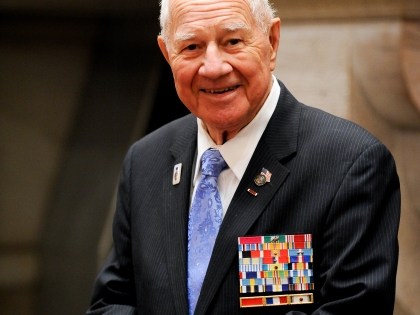
Senate Passes Public Assistance Integrity Act
William J. Larkin Jr.
June 18, 2013
-
ISSUE:
- Public Assistance

Legislation To Curb Abuse of Public Assistance
The New York State Senate today approved the “Public Assistance Integrity Act,” sponsored by Senator Tom Libous (R-C-I, Binghamton), that would help cut down on the flagrant abuse of EBT (Electronic Benefit Transfer) cards by prohibiting welfare recipients from using cash assistance to purchase tobacco, alcoholic beverages, lottery tickets or to gamble.
"Public assistance is designed to help needy families provide for their children until they can transition back to the workforce and become self-sufficient,” Senator Libous said. “This common-sense legislation would protect hardworking taxpayers from abuse while ensuring that families receiving welfare benefits continue to get the temporary assistance they need and deserve.”
Senator Bill Larkin (R-C, Cornwall-on-Hudson) said: “New York’s taxpayers are tired of their tax dollars being abused. This legislation will bring about a new level of accountability to the EBT program while ensuring families can still purchase the necessities they need.”
EBT cards work like a debit card for welfare recipients. This card contains both Food Stamps and Cash Assistance. Food Stamps have strict regulations on what can be purchased, Cash Assistance does not. Cash Assistance is intended for items that can’t be purchased using food stamps, like soap, toothpaste, school supplies and toiletries.
However, recipients can also legally use this cash assistance to buy cigarettes and beer, or even to fund an afternoon at the racetrack or an evening at a local strip club. Currently, there are no laws or regulations against using taxpayer dollars for alcohol, tobacco, lottery tickets or gambling.
If signed into law, the Public Assistance Integrity Act (S966) would limit where EBT cards can be used and what they can be used for. Last year, the bill passed the Senate 56-3 but the Assembly didn’t act on the bill. The Assembly needs to pass the bill this session or federal aid will be at risk.
The federal government has mandated that each state establish a system of fraud prevention in place by February 2014. If the state does not act, the federal government will penalize New York by cutting federal funding for Cash Assistance by 5 percent ($120 million). New York spends over $2.7 billion each year administering Cash Assistance.
“Obviously, the majority of families and individuals receiving public assistance use their assistance responsibly to help care for their families,” said Senator Libous. “But it’s been widely reported that abuse does occur. We want to do everything we can to make sure this much-needed assistance goes to help families, not hurt them.”
Warren County District Attorney Kate Hogan said: “Recipients of assistance should not be permitted to spend their benefit money on illegal drugs, liquor, cigarettes or lap dances. Taxpayers expect their hard earned money to go for the necessities of people in need, and not to pay for someone to frolic around town. We owe the taxpayer more oversight and better accountability. This bill is an important step in providing that control and curtailing this flagrant abuse.”
Warren County Sheriff Bud York said: “It is shocking that the current system allows cash to be used without any oversight. We know from our cases that there is wide-spread abuse, including buying illegal drugs, booze and cigarettes. This bill helps limit this unacceptable practice.”
Paula Reid, Welfare Investigator for Washington County and an officer of the New York State Welfare Fraud Investigators Association, said: “NYWFIA supports this bill because it increases the public’s confidence in the integrity of the social services programs offered to recipients. This bill will help in maintaining that integrity and working with those who use their benefits for their intended purpose.”
The bill was sent to the Assembly.
Share this Article or Press Release
Newsroom
Go to NewsroomPaid Family Leave
August 3, 2016

Senator Larkin - Know the Facts about Lyme Disease
July 14, 2016

